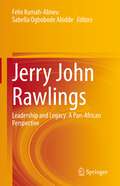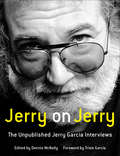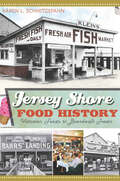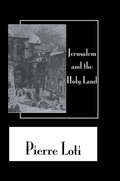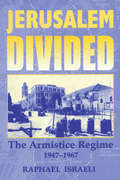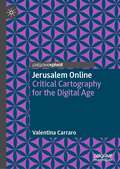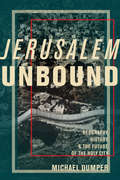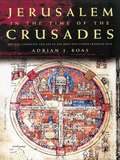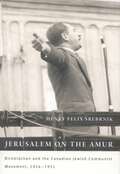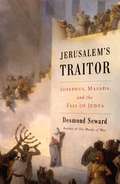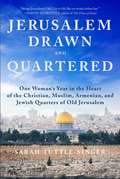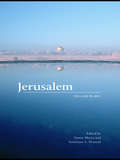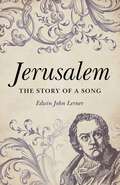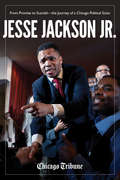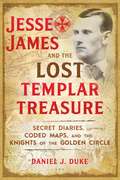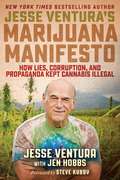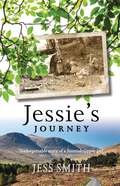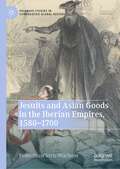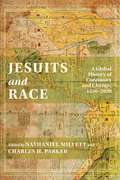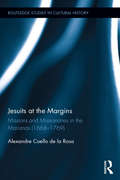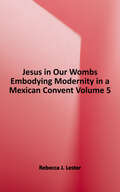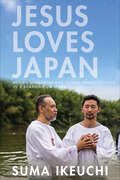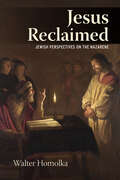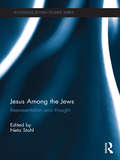- Table View
- List View
Jerry John Rawlings: Leadership and Legacy: A Pan-African Perspective
by Sabella Ogbobode Abidde Felix Kumah-AbiwuThis edited volume examines the leadership and legacy of Ghana’s Jerry John Rawlings within the broader context of Africa’s leadership and democratic governance. The central purpose of the book is threefold. First, it examines the role and place of good and effective political leadership in the development of Africa. Second, it situates Jerry Rawlings’ political style and legacy in the annals of democratic governance in post-independence Africa. Finally, the book adds to the knowledge and understanding of former President Rawlings as one of Africa’s preeminent and transformational political leaders. Taking an interdisciplinary and Pan-African approach, this volume will be of great interest to scholars, policymakers, and students of African politics, African studies, governance, political leadership, democracy, development studies, and political economy.
Jerry on Jerry: The Unpublished Jerry Garcia Interviews
by Dennis Mcnally Trixie GarciaListen in on hours of revelatory conversations with Jerry Garcia, one of the most beloved and missed figures in the world of music, with JERRY ON JERRY. More than twenty years after his death, at too young an age, Jerry remains a cultural icon whose influence and legacy endure. Now, these never-before-heard interviews reveal a candid and poignant side of Jerry, as he speaks openly on everything from religion and politics to his personal life and his creative process. Carefully selected by former Grateful Dead publicist and the band's authorized biographer, Dennis McNally, and curated with the cooperation of the Jerry Garcia Family, JERRY ON JERRY marks the first time these insightful and intimate archival recordings have ever been made available to the public.Here, Garcia talks about what it was like growing up in the San Francisco Bay Area, his obsession with his first guitar, and his first encounters with early R&B, which had a profound and lasting impact on his music. After discussing his brief, but eye-opening stint in the army, Jerry offers up stories of his time spent as a student of the Beats, and his personal and reverent memories of Neal Cassady. He ponders what he sees as the complicated nature of LSD and the oppressiveness of government. He goes on to remember in detail the early days of the Dead, from their first gigs as the Warlocks and their days at 710 Ashbury Street, to the Monterey Pop Festival in 1967 and performing on the road with Jefferson Airplane. Throughout he breaks to opine on movies (one of his favorite subjects), to open up about his songwriting process and his prolific collaboration with Robert Hunter, and his admiration for a broad range of musicians from the Rolling Stones and Bob Dylan to Scotty Stoneman and Bill Keith. Dozens of rare family photographs, and other art and ephemera, many of which have never been seen before, are included here in a PDF. With an introduction written and read by Dennis McNally, and a foreword written and read by Trixie Garcia, Jerry's daughter, this audiobook is the ultimate complement to any collection. JERRY ON JERRY is one of the most revealing and unguarded portraits of the adored front man of the Grateful Dead and a true, long-awaited gift to his fans.
Jersey Shore Food History: Victorian Feasts to Boardwalk Treats (American Palate Ser.)
by Karen L Schnitzphan&“Chock full of photographs, the book dishes on food from the mid-1800s to the mid-1900s, all along the coast from Sandy Hook to Cape May.&” —RedBankGreen No trip to the Jersey Shore would be complete without indulging in the cuisine that helps make it famous. These foods we enjoy today are part of a long tradition beginning in the Victorian era, when big oceanfront hotels served elaborate meals. Diverse dishes and restaurants emerged during prohibition and the Great Depression, when fast food appeared and iconic boardwalk treats developed. Predating the farm to table movement, fancy and fast eateries have been supplied by local fishermen and farmers for decades. So whether you indulge in a tomato pie, pork roll or salt water taffy, take a mouthwatering historical tour and discover timeless treats from Sandy Hook to Cape May. &“Tells the story of the original farm and sea to table American destination. The book is filled with information about the way the NJ shore has eaten through history and the food establishments that have spanned generations, some still operating today.&” —NJ.com &“This book also gives us insights into the earliest days of Atlantic City&’s fine hotels. The Victorian era menus included in the volume are a treasure. I also loved her inclusion of such iconic former restaurants as Hackney&’s and Capt. Starn&’s and the still standing Knife and Fork Inn.&” —Atlantic City Central &“If you enjoy walking the Boardwalk for your pork roll and salt water taffy fix, or if you appreciate the history of the region&’s former great restaurants like Hackney&’s, Capt. Starn&’s and Zaberer&’s, this book will be an entertaining read.&” —Atlantic City Weekly
Jerusalem & The Holy Land
by LotiFirst published in 2002. Routledge is an imprint of Taylor & Francis, an informa company.
Jerusalem Divided: The Armistice Regime, 1947-1967 (Israeli History, Politics and Society)
by Raphael IsraeliTraces the background to the history of the Armistice Regime, established in 1947 to combat the fighting between Jews and Arabs in Jerusalem. The author details the Armistice Commission, which governed its application and the many in-built problems that thwarted their proper functioning.
Jerusalem Online: Critical Cartography for the Digital Age (The Contemporary City)
by Valentina CarraroThe book addresses the rapid shifts which have taken place within cartography, and argues that no amount of technological sophistication will lead to neutral representations, and that as such critical cartography provides a solid foundation for questioning the power of maps. It considers the fragmentation, dynamism and opacity that characterise online maps, and argues for the need of new ways of thinking and researching maps. The book offers an approach grounded in ‘ontological’ social theory and feminist technoscience, and illustrates it through the analysis of three Jerusalem-related mapping controversies. Using online media, historical maps and ethnographic work, each case study explores a different map provider and a recent mapping development: Google Maps and the distributed authorship of web-maps; Waze and algorithmic navigation; OpenStreetMap and crowdsourcing. The book is a key read to faculty and advanced students in Urban Studies and Critical Cartography. It will particularly appeal to those working in the digital geographies
Jerusalem Unbound: Geography, History, and the Future of the Holy City
by Michael DumperJerusalem's formal political borders reveal neither the dynamics of power in the city nor the underlying factors that make an agreement between Israel and the Palestinians so difficult. The lines delineating Israeli authority are frequently different from those delineating segregated housing or areas of uneven service provision or parallel national electoral districts of competing educational jurisdictions. In particular, the city's large number of holy sites and restricted religious compounds create enclaves that continually threaten to undermine the Israeli state's authority and control over the city. This lack of congruity between political control and the actual spatial organization and everyday use of the city leaves many areas of occupied East Jerusalem in a kind of twilight zone where citizenship, property rights, and the enforcement of the rule of law are ambiguously applied.Michael Dumper plots a history of Jerusalem that examines this intersecting and multileveled matrix and, in so doing, is able to portray the constraints on Israeli control over the city and the resilience of Palestinian enclaves after forty-five years of Israeli occupation. Adding to this complex mix is the role of numerous external influences—religious, political, financial, and cultural—so that the city is also a crucible for broader contestation. While the Palestinians may not return to their previous preeminence in the city, neither will Israel be able to assert a total and irreversible dominance. His conclusion is that the city will not only have to be shared but that the sharing will be based upon these many borders and the interplay between history, geography, and religion.
Jerusalem in the Time of the Crusades: Society, Landscape and Art in the Holy City under Frankish Rule
by Adrian J. BoasAdrian Boas's combined use of historical and archaeological evidence together with first-hand accounts written by visiting pilgrims results in a multi-faceted perspective on Crusader Jerusalem. Generously illustrated, this book will serve both as a scholarly account of this city's archaeology and history, and a useful guide for the interested reader to a city at the centre of international and religious interest and conflict today.
Jerusalem on the Amur
by Henry Felix SrebrnikThe Canadian Jewish Communist movement, an influential ideological voice within the Canadian left, played a major role in the politics of Jewish communities in cities such as Montreal, Toronto, and Winnipeg, as well as many smaller centres, between the 1920s and the 1950s. Jerusalem on the Amur looks at the interlocking group of left-wing Jewish organizations that shared the political views of the Canadian Communist Party and were vocal proponents of policies perceived as beneficial to the Jewish working class. Focusing on the Association for Jewish Colonization in Russia, known by its transliterated acronym as the ICOR, and the Canadian Ambijan Committee, Henry Srebrnik uses Yiddish-language books, newspapers, pamphlets, and other materials to trace the ideological and material support provided by the Canadian Jewish Communist movement to Birobidzhan.
Jerusalem on the Amur: Birobidzhan and the Canadian Jewish Communist Movement, 1924-1951 (McGill-Queen's Studies in Ethnic History #225)
by Henry Felix SrebrnikThe Canadian Jewish Communist movement, an influential ideological voice within the Canadian left, played a major role in the politics of Jewish communities in cities such as Montreal, Toronto, and Winnipeg, as well as many smaller centres, between the 1920s and the 1950s. Jerusalem on the Amur looks at the interlocking group of left-wing Jewish organizations that shared the political views of the Canadian Communist Party and were vocal proponents of policies perceived as beneficial to the Jewish working class. Focusing on the Association for Jewish Colonization in Russia, known by its transliterated acronym as the ICOR, and the Canadian Ambijan Committee, Henry Srebrnik uses Yiddish-language books, newspapers, pamphlets, and other materials to trace the ideological and material support provided by the Canadian Jewish Communist movement to Birobidzhan.
Jerusalem's Traitor: Josephus, Masada, and the Fall of Judea
by Desmond SewardFrom a leading historian, the life and works of Josephus in first-century Jerusalem, during the war against Rome, the siege of Masada, and early Christianity
Jerusalem, Drawn and Quartered: One Woman's Year in the Heart of the Christian, Muslim, Armenian, and Jewish Quarters of Old Jerusalem
by Sarah Tuttle-SingerOn a night in 1999 when Sarah Tuttle-Singer was barely 18, she was stoned by Palestinian kids just outside one of the gates to the Old City of Jerusalem. In the years that followed, she was terrified to explore the ancient city she so loved. But, sick of living in fear, she has now chosen to live within the Old City's walls, living in each of the four quarters: Christian, Muslim, Armenian, and Jewish. Jerusalem’s Old City is the hottest piece of spiritual real estate in the world. For millennia empires have clashed and crumbled over this place. Today, the conflict between Israelis and Palestinians plays out daily in her streets, and the ancient stones run with blood. But it’s also an ordinary city, where people buy vegetables, and sooth colicky babies, where pipes break, where the pious get high, and young couples sneak away to kiss in the shadows. Sarah has thrown herself into the maelstrom of living in each quarter—where time is measured in Sabbath sunsets and morning bells and calls to prayer, in stabbing attacks and check points—keeping the holidays in each quarter, buying bread from the same bread seller, making friends with people who were once her enemies, and learning some of the secrets and sharing the stories that make Jerusalem so special, and so exquisitely ordinary. Jerusalem, Drawn and Quartered is a book for anyone who’s wondered who really lives in Israel, and how they coexist. It’s a book that skillfully weaves the personal and political, the heartwarming and the heart-stopping. It’s a book that only Sarah Tuttle-Singer can write. The Old City of Jerusalem may be set in stone, but it’s always changing—and these pages capture that.
Jerusalem: Idea and Reality
by Suleiman A. Mourad Tamar MayerJerusalem, the holy city of three faiths, has been the focus of competing historical, religious, and political narratives from Biblical chronicles to today’s headlines. With an aura that transcends the boundaries of time and place, the city itself embodies different levels of reality – indeed, different realities altogether – for both observers and inhabitants. There is the real Jerusalem, a place of ancient streets and monuments, temples and coffee-houses, religious discourse and political argument. But there is also the imaginary and utopian city that exists in the minds of believers, political strategists, and artists. The study of this multifaceted city poses complex questions that range over several fields of inquiry. The multidisciplinary studies in Jerusalem offer insights into this complexity. Chapters by leading scholars examine the significant issues that relate to the perception, representation, and status of the city at the historical, religious, social, artistic, and political levels. Together they provide an essential resource for anyone interested in the paradoxes that Jerusalem offers.
Jerusalem: The Story of a Song
by Edwin John LernerJerusalem: The Story of a Song is a popular history of England's unofficial national anthem, which began life as a poem by William Blake, was set to music by Hubert Parry and is sung every year at the Last Night of the Proms.
Jesse Jackson Jr.
by Chicago Tribune StaffFor the past 25 years, it seemed like little could impede the quickly accelerating political career of Jesse Jackson Jr., the U.S. Representative for Illinois' 2nd Congressional District and son of iconic civil rights activist Reverend Jesse Jackson. But in just a few short months, the once-promising career of Jesse Jackson Jr. has unraveled amidst investigations by the House ethics committee, speculation about an alleged attempt to buy Barack Obama's Senate seat from Rod Blagojevich, his mysterious medical leave that ultimately revealed his bipolar disorder to the public, and his recent resignation from Congress. Jesse Jackson Jr. is a collection of the most captivating and revealing articles from the past 25 years of award-winning Chicago Tribune political reporting. With fascinating background on Reverend Jackson and his up-and-down relationship with his son, this book delves the professional and personal lives of Jesse Jackson Jr. It is a straightforward, comprehensive portrait of his many successes and the shocking particulars of his recent scandals. This book captures and contextualizes Jackson's impressive political career while serving as the best resource for investigative reporting on his ongoing legal, ethical, and health issues.
Jesse James and the Lost Templar Treasure: Secret Diaries, Coded Maps, and the Knights of the Golden Circle
by Daniel J. DukeAn investigation into the lost treasures of Jesse James and the Freemasons and their connections to the Templars, Rosicrucians, and the Founding Fathers • Explains how Jesse James used techniques involving sacred geometry, gematria, and esoteric symbols to hide his treasures and encode maps • Provides instructions for using the encoding template employed by Jesse James and the Freemasons to hide and recover treasure and sacred relics • Shows how the encoding template confirms the existence of treasures on Oak Island and Victorio Peak and can be traced to a 16th-century book containing a secret map of the New World and the “hooked X” of the Knights Templar Jesse James left behind secret diaries and coded treasure maps. Working to decrypt these maps, Daniel J. Duke--the great-great grandson of Jesse James--reveals hidden treasures yet to be recovered as well as connections between the infamous train robber and Freemasonry, the Knights Templar, the Founding Fathers, and Jewish mysticism. The author explains how Jesse James faked his death and lived out his final years under the name James L. Courtney. He uncovers James’ affiliation with the Knights of the Golden Circle, a secret society that buried Confederate gold across the United States, and shows how the hidden treasures coded into James’ maps were not affiliated with the KGC but with the Freemasons, the Knights Templar, and the treasure of the Temple Mount. Using sacred geometry, gematria, and the Kabbalistic Tree of Life symbol, the author explains the encoded map technique used by the Freemasons to hide and later recover treasures, an esoteric template known as the “Veil”. He shows how the Veil template confirms the locations of Jesse James’ recovered treasures in Texas as well as other suspected treasure locations, such as the Oak Island Money Pit and Victorio Peak in New Mexico. Tracing knowledge of the Veil template back through the centuries, the author reveals the Veil hidden on the cover of a 16th-century book that contains a secret map of the New World and the “hooked X” symbol of the Knights Templar. He shows how the template was used not only to hide treasures but also sacred knowledge and relics, such as within the Bruton Vault, which originally contained secrets tied to Francis Bacon, the Freemasons, the Rosicrucians, and the founding of the United States. Applying the Veil template alongside the esoteric secrets of Poussin’s famous painting, Et In Arcadia Ego, and Cassini’s Celestial Globe, Duke shows how the template reveals other Templar and Freemason treasure sites scattered throughout America and around the world.
Jesse Ventura's Marijuana Manifesto: How Lies, Corruption, and Propaganda Kept Cannabis Illegal
by Jesse Ventura Jen Hobbs Steve KubbyNew York Times Bestselling Author!In this groundbreaking book – for the first time in paperback and fully-updated with all the latest legal information - outspoken freethinker Jesse Ventura lays out his philosophy. Now more than ever before, our country needs full legalization of medical/recreational marijuana and hemp. Seemingly with every day that goes by we find out more positive things about marijuana, a medicinal plant in abundant supply, yet legalization finds stronger resistance from government agencies and big business.Find out why the US government patented CBD and what Big Pharma companies have exclusive rights to create marijuana medication and why the DEA can’t be trusted.Jesse Ventura’s Marijuana Manifesto calls for an end to the War on Drugs. Legalizing marijuana will serve to rejuvenate our pathetic economy and just might make people a little happier. Ventura’s book will show us all how we can take our country back.“More celebs than ever are jumping on the ‘Legalize’ bandwagon. Why? Because it’s safe now. It won’t impact your career anymore. But Jesse Ventura has been a solid proponent of legal cannabis for decades. In Jesse Ventura’s Marijuana Manifesto, he lays out the good sense of legalization, as well as the sheer insanity of prohibition. As a proud American, he pulls no punches calling out the political elite. - Dan Skye, High Times editor-in-chief“Ventura is ultimately quite convincing about the ineffectuality of the War on Drugs, and on the contradictions and corruptions of the Drug Enforcement Administration, a particular bugbear of his.” - Michael Lindgren, The Washington Post
Jessie's Journey: The True Story of a Gypsy Childhood
by Jess SmithA &“remarkable&” account of a family&’s years wandering Scotland and England in a bus, living the traditional life of their people (Caledonia). From the ages of five to fifteen, Jess Smith lived with her parents and sisters and a mongrel dog in an old blue bus. They traveled the length and breadth of Scotland, and much of England too, stopping here and there until they were moved on by the local authorities or driven by their own instinctive need to travel. By campfires, under the unchanging stars, they brewed up tea, telling stories and singing songs late into the night. The &“unforgettable story of a Scottish Gypsy girl&” (Maggie Smith Bendle, civil rights activist), Jessie&’s Journey describes what it was like to be one of the last of the traditional travelling folk. It is not an idyllic tale, but despite the ever-present threat of bigoted abuse and the challenges of scattered schooling, humor and laughter run throughout a childhood teeming with unforgettable characters.
Jesuits and Asian Goods in the Iberian Empires, 1580–1700 (Palgrave Studies in Comparative Global History)
by Pedro Omar Svriz-WuchererThis book analyzes the exchange relations between the colonies of the Iberian Empires, starting from two cities ports, Buenos Aires and Macau in the period 1580-1700. Agents, who were not professional traders such as the members of the Society of Jesus, and the circulation and consumption of Asian goods in the local populations of Buenos Aires and Macau, were analyzed. Both cases of study will show us how these non-state agents- the Jesuits- build their own networks and exchange channels to Chinese goods distribution (i.e silk, porcelain, musk, amber and others) between Asia and Latin American. This book intends to break with the local scheme of Jesuit studies in order to combine the local scale with analysis of inter-regional processes on a continental scale, from a comparative perspective.
Jesuits and Race: A Global History of Continuity and Change, 1530-2020
by Nathaniel Millett; Charles H. ParkerJesuits and Race examines the role that the Society of Jesus played in shaping Western understandings about race and explores the impact the Order had on the lives and societies of non-European peoples throughout history. Jesuits provide an unusual, if not unique, lens through which to view the topic of race given the global nature of the Society of Jesus and the priests&’ interest in humanity, salvation, conversion, science, and nature.Jesuits&’ global presence in missions, imperial expansion, and education lends insight into the differences in patterns of estrangement and assimilation, as well as enfranchisement and coercion, with people from Africa, Asia, and the Americas. The essays in this collection bring together case studies from around the world as a first step toward a comparative analysis of Jesuit engagement with racialized difference. The authors hone in on labor practices, social structures, and religious agendas at salient moments during the long span of Jesuit history in this fascinating volume.
Jesuits at the Margins: Missions and Missionaries in the Marianas (1668-1769) (Routledge Studies in Cultural History #41)
by Alexandre Coello de la RosaIn the past decades historians have interpreted early modern Christian missions not simply as an adjunct to Western imperialism, but a privileged field for cross-cultural encounters. Placing the Jesuit missions into a global phenomenon that emphasizes economic and cultural relations between Europe and the East, this book analyzes the possibilities and limitations of the religious conversion in the Micronesian islands of Guåhan (or Guam) and the Northern Marianas. Frontiers are not rigid spatial lines separating culturally different groups of people, but rather active agents in the transformation of cultures. By bringing this local dimension to the fore, the book adheres to a process of missionary “glocalization” which allowed Chamorros to enter the international community as members of Spain’s regional empire and the global communion of the Roman Catholic Church.
Jesus In Our Wombs: Embodying Modernity in a Mexican Convent (Ethnographic Studies In Subjectivity Ser. #5)
by Rebecca J. LesterThis book takes us behind the walls of a Roman Catholic convent in central Mexico to explore the lives, training, and experiences of a group of postulants - young women in the first stage of religious training as nuns. This book considers how these aspiring nuns learn to experience God by cultivating an altered experience of their female bodies.
Jesus Loves Japan: Return Migration and Global Pentecostalism in a Brazilian Diaspora
by Suma IkeuchiAfter the introduction of the "long-term resident" visa, the mass-migration of Nikkeis (Japanese Brazilians) has led to roughly 190,000 Brazilian nationals living in Japan. While the ancestry-based visa confers Nikkeis' right to settlement virtually as a right of blood, their ethnic ambiguity and working-class profile often prevent them from feeling at home in their supposed ethnic homeland. In response, many have converted to Pentecostalism, reflecting the explosive trend across Latin America since the 1970s. Jesus Loves Japan offers a rare window into lives at the crossroads of return migration and global Pentecostalism. Suma Ikeuchi argues that charismatic Christianity appeals to Nikkei migrants as a "third culture"—one that transcends ethno-national boundaries and offers a way out of a reality marked by stagnant national indifference. Jesus Loves Japan insightfully describes the political process of homecoming through the lens of religion, and the ubiquitous figure of the migrant as the pilgrim of a transnational future.
Jesus Reclaimed: Jewish Perspectives on the Nazarene
by Rabbi Walter HomolkaAfter centuries of persecution, oppression, forced migrations, and exclusion in the name of Christ, the development of a Jewish “Quest for the Historical Jesus” might seem unexpected. This book gives an overview and analysis of the various Jewish perspectives on the Nazarene throughout the centuries, emphasizing the variety of German voices in Anglo-American contexts. It explores the reasons for a steady increase in Jewish interest in Jesus since the end of the eighteenth century, arguing that this growth had a strategic goal: the justification of Judaism as a living faith alongside Christianity.
Jesus among the Jews: Representation and Thought (Routledge Jewish Studies Series)
by Neta StahlFor almost two thousand years, various images of Jesus accompanied Jewish thought and imagination: a flesh-and-blood Jew, a demon, a spoiled student, an idol, a brother, a (failed) Messiah, a nationalist rebel, a Greek god in Jewish garb, and more. This volume charts for the first time the different ways that Jesus has been represented and understood in Jewish culture and thought. Chapters from many of the leading scholars in the field cover the topic from a variety of disciplinary perspectives - Talmud, Midrash, Rabbinics, Kabbalah, Jewish Magic, Messianism, Hagiography, Modern Jewish Literature, Thought, Philosophy, and Art – to address the ways in which representations of Jesus contribute to and change Jewish self-understanding throughout the last two millennia. Beginning with the question of how we know that Jesus was a Jew, the book then moves through meticulous analyses of Jewish and Christian scripture and literature to provide a rounded and comprehensive analysis of Jesus in Jewish Culture. This multidisciplinary study will be of great interest not only to students of Jewish history and philosophy, but also to scholars of religious studies, Christianity, intellectual history, literature and cultural studies.
